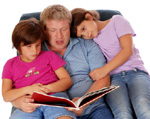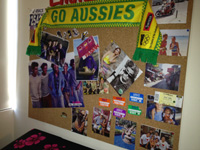 All kids from young to teenagers need the basics of life – like food, warmth, shelter and clothing. But they also need to feel loved and secure. By giving our children all the things they need, we can help them be safe, strong and thrive.
All kids from young to teenagers need the basics of life – like food, warmth, shelter and clothing. But they also need to feel loved and secure. By giving our children all the things they need, we can help them be safe, strong and thrive.
Below are some ideas that can make a world of difference and help your children feel loved and secure.
1: Meeting their everyday needs
Babies and children need to know there is someone who loves them and that their needs will be met as soon as possible. This means:
- Feeding them when they’re hungry
- Keeping them comfortable depending on the weather
- Helping them if they are in pain, scared or upset
- Providing family routines
- Making sure they feel safe and secure
It’s normal for babies to cry:
Babies cry an average of two to five hours every day, it’s their way of talking. See the below checklist and it will help you work out what’s wrong (and if they won’t stop, just love them anyway!).
Crying checklist:
- Check nappy
- See if their hungry or uncomfortable
- Make sure their not in pain or have a fever (if they do, call a doctor)
- Wrap them safely in a soft blanket and cuddle them
- Take them for a ride in a walker or car
- Place them in a bouncy chair or gentle infant swing
- Play soft music, sing or hum quietly
- Give them a soothing bath.
2: Feel safe and secure
When children feel safe and secure, they learn to trust other people. Children who don’t feel safe can be anxious and unhappy. This can affect their health and learning. But when they learn that they can trust the adults around them, it helps them grow up happy, healthy and to enjoy the world around them.
Firstly, we make children feel safe by meeting their basic needs. But we also make them feel safe by showing them that we love them.
3: Love and hugs
Hugs and cuddles help children to feel safe and comforts them. Holding your children, picking them up, sitting them on your lap, kissing and cuddling, are all good ways to show that you care.
Babies and toddlers usually love games like bouncing them on your knee, gently tickling, and games that involve wiggling their fingers or toes can be lots of fun.
Holding a toddler’s hand when out walking helps to protect them from danger and to feel safe and secure in the outside world.
Older children need lots of affection to remind them that you care. You can do this with cuddles, a ‘goodnight’ kiss and a hug. Snuggling up close while reading a story together or watching TV is great for your child and you.
Think about your childhood…
If you were bought up with lots of hugs and praise from your parents, then this will be normal for you. But if you weren’t bought up like that, it might feel strange to do these things. The more you do it, the more natural it will feel. Keep asking yourself:
- What is good for my child?
- What kind of parent do I want to be?
4: Plenty of praise
Your child wants to please you. If you praise them when they do well at something or are trying hard, it will make them want to do it again. Praising your child for being good will make them want to be good, and it will help them feel good about themselves.
Children who feel good about themselves tend to:
- learn more easily and make more effort to achieve
- get into less trouble
- get on well with others
- make friends more easily
- feel happier and more secure.
5: Smiles
Give your child lots of smiles, smiling is one of the first things they learn to do for you.
Smiling is one of the simplest ways of helping children feel happy and safe. When you smile at children you are telling them that:
- you love them
- you enjoy their company
- you are pleased with them
- you are taking notice of them
- you are happy
- you are good fun to be with.
Smiles work even better when you are looking into your child’s eyes. Good eye contact when smiling, listening or talking to your child helps to get their attention.
6: Talking to babies, children and teenagers
Babies: It’s good to talk and sing to babies from the time they are born. A gentle voice helps your child to feel relaxed and secure. It helps them to get to know you, and to know that you are there to look after them.
Children: When you talk to children they soon start learning words themselves. The more you talk to them, the more they will learn.
They will also learn more if you use proper adult words most of the time. Learning words helps them to communicate and to understand more about the world. As they get older, words will become one of their most important tools.
Children with a good use of words find it easier to express themselves, to make friends, and to learn at school and at home.
Some ideas for talking to your children: It’s easy to switch off when you’re busy and tired, but try to put aside and talk to your child.
- Quiet time together before bed: This can just be a few minutes of talking about each other’s your day and it will make it a special time.
- Name games: When kids are learning words, play games like “Where’s your tummy?”… “Where’s the cat?”… “What’s that?”
- Bedtime stories: Or just read books at any time. Even if kids are young, they like looking at the pictures.
- Sing: Songs are a great way to learn words.
- Talk topic: Ask them to pick a topic, and you can tell them a story about it from your own childhood.
- Play ‘highs and lows’: If your child is a bit older, talk about the best thing and worst thing that happened that day.
Teenagers: It’s amazing some of the things we will commit to memory—like key stats for a sports team, the lyrics of an old song or words of a famous leader. But how many of us can answer even simple questions about our children, who are as important to us as anyone or anything in our lives? These questions below will help you explore new territory with your child and help continue to build a deeper connection.
- Who is your all-time hero?
- What is your most prized possession?
- What is your favorite meal?
- Who’s your best friend?
- If you had $20 to spend, what would you buy?
- What would you like to do when you grow up?
- What do you most like to do with me?
- What causes you to lose sleep?
- What were your greatest achievements and disappointments in the last year?
- What’s one area in which I can support you in the next six months?
7: Listening
Your child wants to please you. If you praise them when they do well at something or are trying hard, it will make them want to do it again. Praising your child for being good will make them want to be good, and it will help them feel good about themselves.
Children who feel good about themselves tend to:
- Learn more easily and make more effort to achieve
- Get into less trouble
- Get on well with others
- Make friends more easily
- Feel happier and more secure.
8: Learn new things
You don’t need fancy toys or equipment to give your child new experiences. You can use everyday things around you, go for walks or explore the beach or park. Why not start a shell collection – or look for special stones? Or what about joining a toy library? You will be able to develop it each time they are with you.
It makes learning fun and teaches them about the world.
They need other people too – other children to play with and relationships with people of all ages.
For older children it’s good to be involved in their school activities and homework, and to meet with their teacher.
New experiences can include simple things like:
- tell a story from your childhood
- Play a game:
- a board game if they’re older
- peek-a-boo if they’re younger
- or naming games like ‘I spy..’
- Sing a song
- Explore the house and garden
- Read a book
- Teach your kids shapes and colours
- Take your kids to a friend’s place to visit
- Praise your children for something new they did
or something they did well - Take your child for a walk to the park, beach or anywhere near by
- Do some drawing, painting or colouring
- Pick up stones, look at flowers…new experiences are everywhere for kids.
9: Take care of their feelings
Sometimes it’s hard for children to find the right words, or tell you when they are sad or frightened.
Babies and small children can be frightened by anything new and different, when there is no real danger. A stranger, a clown, or a loud noise, can all be very scary for a toddler who is not used to them. Sometimes you might feel tempted to laugh, to tease them or tell them ‘not to be silly’. What they really need is for you to comfort them and give them a simple explanation.
This will help them feel good about themselves, and feel OK about talking to you if they have a serious problem.
10: Rewards and special treats
All parents want their children to behave. If you give kids attention when they are good, it will make them want to be good more often. If you only notice them when they are naughty, it might make them want to be naughty more often.
The best reward for being good is getting your time and attention. Taking time to play and have fun together doesn’t have to cost money. A picnic, a walk in the park or a trip to the beach can be lots of fun.
One idea for giving kids your time and attention…
Make a scrapbook or cork pin-board with them
 Children love stories about themselves – it helps them feel loved and important. You could make a scrapbook or even a cork pin-board that’s all about your child from the time they were born. Put all sorts of things in/on it, cork boards are a great way to display dreams and positive affirmations:
Children love stories about themselves – it helps them feel loved and important. You could make a scrapbook or even a cork pin-board that’s all about your child from the time they were born. Put all sorts of things in/on it, cork boards are a great way to display dreams and positive affirmations:
- Photos of holidays, friends and things they like.
- Things they’ve said
- A favourite birthday card
- Achievements ribbons
- Concert and event tickets
- Their favourite pop singer-poster
It’s always a comforting time when we sit down and review it. I remind them to keep it fresh and updated on semi-regular basis.
I made this cork-board for under $50 which I got everything from Bunnings i.e. cork floor tiles, backing board, screws, plaster plugs and liquid nails. Size is 91.5mm x 1220mm (it fitted 12 tiles perfectly)


















Comment